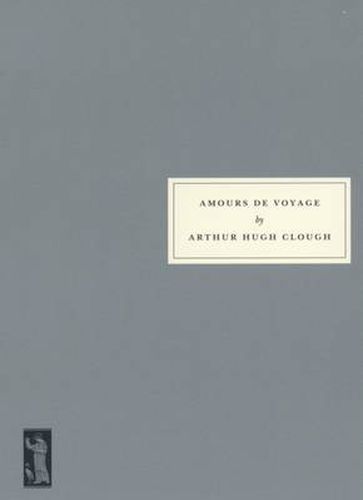Readings Newsletter
Become a Readings Member to make your shopping experience even easier.
Sign in or sign up for free!
You’re not far away from qualifying for FREE standard shipping within Australia
You’ve qualified for FREE standard shipping within Australia
The cart is loading…






Amours de Voyage (1849) is a novel in verse and is arranged in five cantos, or chapters, as a sequence of letters. It is about a group of English travellers in Italy: Claude, and the Trevellyn family, are caught up in the 1849 political turmoil. The poem mixes the political (‘Sweet it may be, and decorous, perhaps, for the country to die; but,/On the whole, we conclude the Romans won’t do it, and I sha'n’t’) and the personal (‘After all, do I know that I really cared so about her?/Do whatever I will, I cannot call up her image’). The political is important - hence the Persephone edition reproduces nine London Illustrated News drawings of the battlefront - but the personal dilemmas are the crucial ones. Claude, about to declare himself, retreats, then regrets his failure to speak. It is this retreat, his scruples and fastidiousness, that, like a conventional novel, is the core of Amours de Voyage. The poem thus contributed something important to the modern sensibility; it is a portrait of an anti-hero; it is about love and marriage (the difficulties of); and it is about Italy.Clough wrote to his mother: ‘St Peter’s disappoints me: the stone of which it is made is a poor plastery material; and indeed, Rome in general might be called a rubbishy place - The weather has not been very brilliant. ’ As Julian Barnes points out in his new Persephone Preface: ‘If you want a one-word introduction to the tone, sensibility and modernity of Arthur Hugh Clough, you have it in that single, italicised (by him, not me) word: rubbishy.’ Clough was unimpressed by Rome and so is his hero, Claude, ‘a very unGrand Tourist’. ‘What his friend Arnold perceived to be the weaknesses of Clough’s poetry,’ continues Julian Barnes, ‘are precisely what over time have come to seem its strengths - a prosey colloquiality which at times verges on awkwardness, a preference for honesty and sarcasm over suavity and tact, a direct criticism of modern life, a naming of things as themselves. It is absolutely contemporary…It is also a highly contemplative and argumentative poem, about history, civilisation and the individual’s duty to act.And it is, as the title tells us, a love story - or, this being Clough, a sort of modern, near-miss, almost-but-not-quite love story ( I am in love you say; I do not think so, exactlyA ) with mismatching, misunderstanding, tortuous self- searching, and a mad, hopeful, hopeless pursuit leading us to a kind of ending.
$9.00 standard shipping within Australia
FREE standard shipping within Australia for orders over $100.00
Express & International shipping calculated at checkout
Stock availability can be subject to change without notice. We recommend calling the shop or contacting our online team to check availability of low stock items. Please see our Shopping Online page for more details.
Amours de Voyage (1849) is a novel in verse and is arranged in five cantos, or chapters, as a sequence of letters. It is about a group of English travellers in Italy: Claude, and the Trevellyn family, are caught up in the 1849 political turmoil. The poem mixes the political (‘Sweet it may be, and decorous, perhaps, for the country to die; but,/On the whole, we conclude the Romans won’t do it, and I sha'n’t’) and the personal (‘After all, do I know that I really cared so about her?/Do whatever I will, I cannot call up her image’). The political is important - hence the Persephone edition reproduces nine London Illustrated News drawings of the battlefront - but the personal dilemmas are the crucial ones. Claude, about to declare himself, retreats, then regrets his failure to speak. It is this retreat, his scruples and fastidiousness, that, like a conventional novel, is the core of Amours de Voyage. The poem thus contributed something important to the modern sensibility; it is a portrait of an anti-hero; it is about love and marriage (the difficulties of); and it is about Italy.Clough wrote to his mother: ‘St Peter’s disappoints me: the stone of which it is made is a poor plastery material; and indeed, Rome in general might be called a rubbishy place - The weather has not been very brilliant. ’ As Julian Barnes points out in his new Persephone Preface: ‘If you want a one-word introduction to the tone, sensibility and modernity of Arthur Hugh Clough, you have it in that single, italicised (by him, not me) word: rubbishy.’ Clough was unimpressed by Rome and so is his hero, Claude, ‘a very unGrand Tourist’. ‘What his friend Arnold perceived to be the weaknesses of Clough’s poetry,’ continues Julian Barnes, ‘are precisely what over time have come to seem its strengths - a prosey colloquiality which at times verges on awkwardness, a preference for honesty and sarcasm over suavity and tact, a direct criticism of modern life, a naming of things as themselves. It is absolutely contemporary…It is also a highly contemplative and argumentative poem, about history, civilisation and the individual’s duty to act.And it is, as the title tells us, a love story - or, this being Clough, a sort of modern, near-miss, almost-but-not-quite love story ( I am in love you say; I do not think so, exactlyA ) with mismatching, misunderstanding, tortuous self- searching, and a mad, hopeful, hopeless pursuit leading us to a kind of ending.